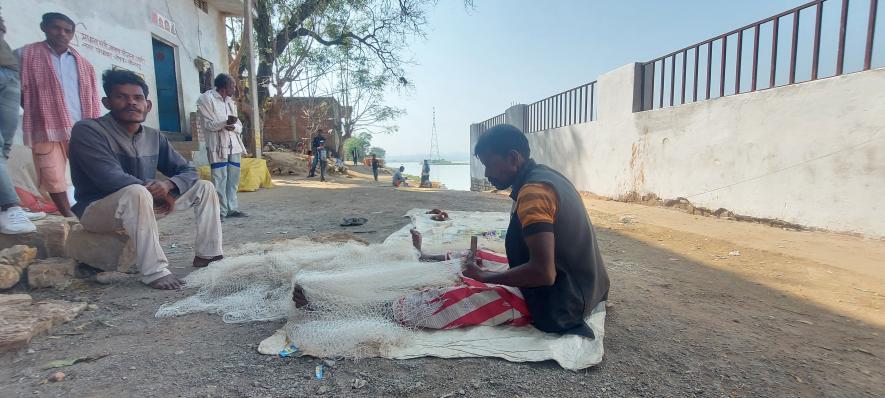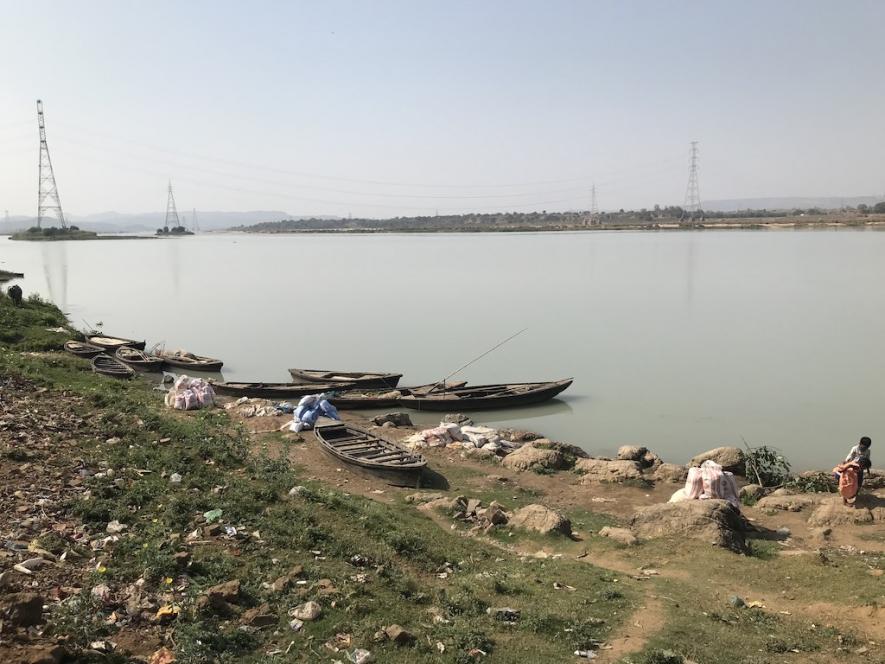UP Elections: Amid Livelihood Crisis, Which Party Will Nishads Trust This Time ?

Sonbhadra: On April 3, 2020, when the nationwide lockdown was in place to prevent the spread of coronavirus, Anil Kumar Sahni, 26, had stepped out with his cycle cart to sell vegetables. As he reached the road passing through his hamlet, he was caught by policemen and brutally thrashed.
Following the incident, he never dared to go out to sell vegetables again despite it being included in the list of essential items that was exempted from the curbs. The vegetable stock back home also rotted.
He also stopped going to the river bed of Sone to pluck vegetables, thinking that the next consignment would also meet the same fate if not sold. As a result, the entire crop got destroyed as it was never plucked. It caused him a loss of around Rs 3 lakh.
Almost all vegetable growers belonging to the Nishad community, at Mallahi Tola in Sonbhadra district’s Chopan Nagar Panchayat (notified area council), narrate the same saga of losses they suffered during the lockdown.
Their anger can be gauged from their resolve to “teach” the ruling Bharatiya Janata Party (BJP) a lesson in the ongoing elections. Sonbhadra is going to polls on March 7 in the last phase of the ongoing Uttar Pradesh Assembly elections.
Located on the banks of Sone river, Mallahi Tola is their hub with over 200 houses of the community. Their traditional occupations have remained water-centric, including fishing, boating and sand dredging. But of late, with the decline of fishes in the river because of large-scale sand mining, they have now shifted to growing vegetables on the sandy foothills of the river.
“I grow lauki (pumpkin), torai or nenua (sponge gourd), kohra (red pumpkin), karela (bitter gourd), baingan (brinjal), etc. We have not forgotten the losses we faced during the lockdown. It’s time now to reply to the state terror, which was unleashed on us in the name of strictly enforcing the lockdown,” he told NewsClick.
The Nishads claim to have a two crore strong population in the state and they are facing a serious livelihood crisis because their rights over rivers has been virtually taken away.
Ram Sumer intervened and said people belonging to the community were no more awarded with fishing and sand mining contracts.
“We are deprived of our centuries-old occupation. We are not allowed to ferry our boats because of the large-scale mining activities in the river. In spite of having a better understanding of a riverine ecosystem than anyone else, we no longer have a hold on our traditional business,” Sumer said, and added, “We do not need free ration (under the public distribution or PDS). Give us back our employment so that we can earn with respect.”
They are apparently unhappy with their MLA, BJP’s Sanjiv Kumar Gaur, who, they said, never visited them in the past five years.

“Several people of the locality died of gasping for air during the second wave of Covid-19, but he never bore the pain to know about the well-being of his electorates. Whenever we went to him seeking his help, he mistreated us instead of extending a helping hand,” he complained.
Rangeeta Nishad was a halwai (sweets maker) who used to prepare delicacies for marriage functions. He died in September last year after complaining about breathing difficulties for around three months. Though he had all symptoms of Covid-19, the deceased family could not claim that the virus caused the death as the patient had not undergone an RT-PCR or rapid antigen test.
But Jokhan Devi has a Covid-19 positive report to prove that her husband Hiramani, 50, died on April 24, 2021 after contracting the virus.
Hiramani, the father of three was a cycle cart puller. He suddenly developed high fever, cough, and breathing. He was taken to the district hospital for treatment, but the doctors there allegedly refused to admit him. He was rushed to a private nursing home where he breathed his last after eight days.
Adding to the apathy and negligence on part of the government, his family is yet to receive any compensation. The state government had announced an ex-gratia payment of Rs 50,000 for the kins of those who died of Covid-19.
“I have lost trust in the government’s health infrastructure,” added Jokhan.
Deepu Nishad, 22, had to quit studies after 10th grade because his father suffered paralysis and it became difficult to sustain a family of seven.
“Depriving us from our traditional source of livelihood, the government made us a daily wage labourer,” alleged the young man who works as a labourer at construction and sand mining sites to earn a living.
Vishal Kumar Sahni, who sells chicken in the locality, added to Deepu complaints, saying, “When we were left unemployed, we shifted to daily wages. It is not our choice, but a compulsion. Pariwar bhi to chalana hai (After all, we have to run our families),” he said.
The government still gives leases for sand extraction, but the poor cannot afford to place bids. “We, the poor Nishads, are not allowed to do sand extraction manually, but those with deep pockets do so with machines. Sand excavation tenders are still allotted to our names, but it is carried out by powerful people as we do not have huge money to afford such contracts,” he said.
A blanket ban was imposed on all types of sand mining by the National Green Tribunal (NGT) on June 24, 2018. Later, it was allowed, using small machines, provided the main channel of a river was left untouched. Following amendments in the order, the government resumed leasing out river patches for sand removal.
But those who are awarded the tender and violate terms and conditions, use modern tools such as earth mover, etc. to extract the sand from deep inside the river. “It is creating an imbalance and affecting the environment. It is also one of the main reasons behind ground water depletion,” said Ram Sumer while weaving a fish net in front of his house close to the river bank.
The Nishads have also lost their rights over fish stocks in rivers and government-owned ponds.
“The fish tenders are won by big traders who employ us to put eggs. Once it grows in size, we take the fishes out and get paid. Apart from this, we have no right over rivers and ponds,” said Prabhu Narayan, 60.
He also noted that earlier there were fish in all rivers. But now, even small rivers are empty. Lack of water in smaller rivers and pollution in large rivers due to dams have led to the depletion of fish stocks.
After motor operated steamers and cruises took over the waterway traffic, the community lost this means of livelihood as well.
Following the collapse of all traditional sources of livelihood of the community, he began growing vegetables on the river bed.
“I harvested at least two quintals of vegetables every third day during the lockdown, but failed to sell them as the markets were closed. Fearing cops, we did not show up on the streets. As a result, vegetables roughly worth around Rs 3 lakh had rotten,” he said.
Mangru Sahni also suffered a huge loss in the lockdown. “I lost 50 quintals of vegetables. It caused me to face a loss of around Rs 2.8 lakhs. Even the animals were not eating them during the period,” he added.
They said only 10-15 people from the locality are engaged in catching fish; the rest either grow vegetables or have migrated to big cities in search of livelihood.
Gulab, who goes by a single name, is handicapped. His married daughter Gunja Devi earns a living for the entire family. “I grow vegetables on sandy patches on the river bed. It is government land. Sometimes officials create problems. We have to bribe them to avoid harassment. Many of us have to pay lagan (land tax) to local upper caste people who claim that the land belongs to them,” she added with anguish.
They said nothing has been done for their welfare even by their own leaders. They alleged Sanjay Nishad, the founder of the Nishad Party, an ally of the BJP in the state, too “betrayed” them.
“He is doing politics in our names. He formed his party to serve his vested interests. The only benefit we got from the party is that our presence were acknowledged with its formation,” people from the community said.
The Nishad community accounts for 8% of the state’s total voters. Therefore, every political party is making tall promises to woo them.
The incumbent BJP is promising reservation for the Nishads. The opposition Samajwadi Party is talking about giving free boats to people from the community while the Congress is assuring rights over the river.
Though it is difficult to predict as to which party the community will trust, one thing clear -- the BJP has lost the trust of a section of the society. As a result, a split in the party’s vote bank is certain.
Author Ramashankar Singh, who is writing a book on the community, said the Nishads have been facing a troubled time.
“Despite low returns and hard work, the community still largely sticks to its traditional business of fishing, sailing boats, and excavating sand from rivers. They are very slow in adapting to changes. They are educationally backward and there is a lack of awareness among them on the importance of education. These are the reasons why they are still not part of the mainstream society,” he said, alleging that the government has also not done much for their upliftment.
The community members, he said, do not any interference in the river ecosystem, which is largely their source of livelihood.
“They will be destroyed if rivers are not saved,” he concluded.
The community demands that it be recognised as a Scheduled Caste (SC). The previous state government has already included Manjis, a sub-caste of Nishads, in the SC category.
Get the latest reports & analysis with people's perspective on Protests, movements & deep analytical videos, discussions of the current affairs in your Telegram app. Subscribe to NewsClick's Telegram channel & get Real-Time updates on stories, as they get published on our website.























